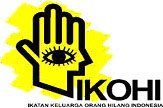




Ram is leaving us, Fare- WELL !
It is really sad to say goodbye, but life has to go on, people moves on, on and on and ….
Tonite,25 September 2005, Ram will go back to Nepal after more than 5 months of stay here in Gwangju City, Repubic of Korea.I made interview of Ram for an online publication but up until now is not yet posted, so I think I have to post if here as a tribute to our friend and co-intern Ram Prasad Sharma.
The interview:
Q & A with a Human Rights Intern
Ram Prasad Sharma
(Advocacy Forum – Nepal)
1- Please tell us about yourself ?
My Name is Ram Prasad Sharma. By profession I am Advocate of Supreme Court [Human Rights Lawyer] of Nepal. I have been working with the Advocacy Forum Nepal as a legal officer since the last 5 years.
2) Tell us about your country?
Nepal is one of the Hindu Kingdoms in the world. It covers an area of 147,181 square kilometers that stretches 145 to 241 km north to south and 850 km west to east. Geographically Nepal is sandwiched between two super power countries, China and India. Kathmandu is the capital. Environmentally it is mountainous in the northern parts. The hills that separates Mahabharat range to Chure hills and Terai is in the south. The world highest peak, Mount Everest is 8,848 meters high in the north; lowest point is 70 meters from the sea level. It is with a mixed biodiversity.
The population of Nepal is 23 million. More than 90 percent of the population is Hindu. And 90 percent of the people depend on agriculture for their livelihood. More than 25 ethnic groups exist and different languages are being spoken but the official language is Nepali. The Lord Buddha was born in Nepal.
3) Tell us about your organization?
Advocacy Forum- Nepal, is a non-profit or non-government organization established to promote and strengthen human rights and rule of law in Nepal. Advocacy forum has following program and activities:
Custody Monitoring Program
It is the main program of Advocacy Forum. The Forum has 5 Regional offices and 1 head office in the capital, Katmandu. Almost 30 police custodies are covered by forum’s regional offices and head office. Every day forum lawyer visits custody to survey the detainee’s basic legal and human rights. Forum lawyers are free to take interview with detainees any time. The Forum also establishes mechanism for lawyers to have access into police custody. The Forum fulfills the need of prisoners for legal services since private lawyers and firms neglect in providing this help. The Forum advocates that detainees must first be visited by lawyer or a legal counsel before they are presented to the court. The accused must know what kinds of charges are filed against him. Every three months the Forum calls for consultation meetings among the Police investigation departments, judges, public prosecutors and private lawyers in order to improve the investigation system of Nepal and the role played by other stakeholders. The Forum shares figures and evidences which they found in custody to public prosecutors offices and the courts. The Forum has been providing legal aid to those people who can’t afford the services of private lawyers. The Forum is strictly opposed to juvenile detainees. The Forum support and provide services to these juvenile delinquents, torture victims and medical services to sick persons inside the prison.
Documentation of Extra Judicial Killings and Disappearances -
Advocacy Forum has been documenting extra judicial killings, disappearances, and abductions, tortures and abuses caused by the state and non state actors during the civil war and various encounters in Nepal. If some parts of Nepal have clashes, encounters or battles, Forum lawyers are sent to conduct investigation. Lawyers meet with victims, victim’s family, eye witnesses, and concerned authorities. The Forum documents what kind of human rights violation cases were made and forward the information to international human rights organization. Questions were raised to security forces through the help of international human rights organizations. The royal army was pressed to form a court of inquiry to mete penalty to those security officer who committed violations and crimes.
The Forum is keeping the record of how may people lost their lives, how many people were injured, abduction and disappearances. It also provides free legal aid to the people. Forum lawyers file cases of habeas corpus in courts to prevent people from illegal detention. Almost 500 habeas corpus cases had been handed by the Forum’s lawyers. The cases continue to increase rapidly.
Juvenile Justice
The Forum has always been providing free legal and medical supports for juvenile detainees. If Forum lawyers found juveniles in the custody of police, they would interfere and invoke child rights and child law of Nepal. Almost 20 juveniles had been sent to child care centres from the police custody with due process of law.
Medical support for victims of torture and cases filed against the perpetrators
The Forum aims to reduce torture and establish a fair trial system in Nepal. When the Forum’s lawyer found any torture victims in police custody and jail they took them to the hospitals to check their physical and mental condition. If the victim was tortured by authorities, then a Forum lawyer file a case against the perpetrators according to the Nepalese compensation act.
Programs for the jail/custody personnel, public prosecutor offices and other authorities
Advocacy Forum has been providing training seminar and workshop for the police authorities (especially those who are involve in investigation), judges, jailors, public prosecutors and private lawyers in improving judicial-criminal system in Nepal. The Forum had established libraries in the police station, detention centers and jails.
4) What do you expect to gain from this internship program?
As an intern I would like to learn about following subjects: democratic movement of Korea and how they achieved it; compensation by the government of those injured, killed and disappeared; labor movement of Korea; democratic movements here in Kwangju City, in Seoul, Busan and other cities; Marshal act during the 1980s; Migrant Labor Laws and the problems of migrant people in Korea (specially SARC countries); interview and dialogue with victims and victims families of democratic movement during the 1980’s; I like to learn about the activities of the National Human Rights Commission (NHRC) of Korea and how it is working for the promotion of Human Rights here in Korea and the kind of international solidarity they do.
5) What can you give in return to the Foundation?
As a human rights lawyer I can give the following in return to the Foundation: I can share the human rights conditions (human rights abuses, etc.), norms and humanitarian laws in my country; documentation of all kind of human rights abuses; share my knowledge about international human rights law and human rights treaties; share the background of civil war in Nepal, its reasons, effects and the violations of human rights and other abuses both from the government and rebel’s side; inform about the problems of disappearances, abductions, extrajudicial killings and tortures in Nepal; and also give background of the democratic movements of Nepal after February 1, 2005 Coup d’ etat by the King.
6- What is the present political climate in your country, its human rights condition and situation?
The present situation of Nepal is marked by gory murders, indiscriminate killings, and disregard of humanitarian values. My country has been in a state of civil war since 1996 when the Communist parties (Maoists) took weapons against the monarchy of Nepal. The violent conflict is the main reason for the widespread violation of human rights and disregards for humanitarian law. There is no rule of law and there’s a political deadlock. Human Rights violation is on the rise. Extra judicial killings in fake encounters have grown rapidly. A number of people have disappeared; almost 2000 disappearance cases had been registered at National Human Rights Commission. Arbitrary arrests and detentions by the security forces are increasing rapidly.
Political leaders, the prime minister, ministers, and former prime ministers were arrested and some of them are detained on a house arrest for over a long period of time. Some still languishes at detention centers. Human rights activists are threatened as well, some have left the country due to security reasons.
After Feb. 1st 2005, media crackdown was instigated by the King. There is no press freedom; independent news is censored by the Nepalese government. Some people from the media and the press were locked by government. Local newspapers and radio are under threat. They don’t have the right to broadcast news that is anti-government.
On the other hand Maoists are putting pressure on human rights activists asking them to register to them. Now government is sponsoring village defense forces to counter Maoists. More than 350 houses at Chanaute Kapilwastu district were vandalized, torched and five innocent people were killed on charge of being Maoists. Simultaneously in Dhading a neighboring district of the Capital Katmandu, the government is forcing young people to join them in retaliation against Maoists.
A lot of people had migrated to other places due to this arm conflict. There is no parliament, the King appoints everyone: ministers, district, zonal and regional authorities. This illegal authority has suspended 140 government employees. No courts orders are being respected thus, weakening the judiciary. Human rights lawyers are threatened and victims are silently terrorized. Victims are not given justice, they can’t even file complaints even after suffering from serious torture since the security forces or the army in particular threatens them and their families.
7) How does your organization addresses these issues and concerns on democracy, peace and human rights?
Advocacy Forum continues to lobby for peace and democracy since it was established. Human rights violation is a serious problem in Nepal. My organization serves as a human rights watch dog. It has been working for the protection and respect of fundamental and human rights of the people. It conducts public awareness campaign, publication, seminars, workshops, field monitoring and consultation meetings to address human rights issues. The Forum advocates both to government and the rebels to respect and uphold human rights and humanitarian law. The forum also helps people to advocate their issues both in the national and international human rights organizations.
8) What are your impressions about Korea?
As an intern I have the chance to learn about Korean democratic movement of 1980s. Those people who actively participated during the 1980s democratic upraising are now well reputed people and considered patriots. The stories of their bravery are even covered in school curriculum. Government and some NGO has been collecting their story to promote it and so people will remember their valor. I admire the Korean peoples struggle for democracy and becoming a well developed economy. I appreciate Korean democracy and how the people are able to exercise their fundamental, human rights and live freely in a democracy.

Sunday, September 25, 2005
Fare- WELL ! Ram
Friday, September 09, 2005
JUSTICE FOR MUNIR! JUSTICE FOR ALL!
Press Statement on MUNIR's 1st Death Anniversary
Today, September 7, 2005 is exactly one year after Munir passed away. He died on a Garuda plane on his way to Netherlands from Jakarta. The official cause of his death was poisoning due to an extreme amount of arsenic found in his body. The death of Munir was politically motivated.
His assassination is a threat to human rights and democracy in Indonesia.
Although the investigation and judicial process on Munir case has been conducted, it is still far from complete. Up until now, the trial has only identified perpetrators but not the masterminds who remain at large. It is important that both direct perpetrators and the masterminds should be punished to give justice to Munir, his family, the Indonesian people and the international human rights community he served.
Therefore, to commemorate Munir’s 1st Death Anniversary, we would like to repeat our call to Indonesian government to act on this case judiciously. The Indonesian government should ensure a fair, impartial and independent trial on the case of Munir. The whole truth should be made known and justice meted out.
This treacherous act of murder to a human rights defender should be resolved at the soonest possible time. Justice delayed is justice denied. The government is seen to manipulate this case through the passage of time and might be shelved and forgotten. But the human rights community in Indonesia and the rest of the world remain vigilant. The crime committed against Munir will never be forgotten. This utter violation of the basic right to life of active human rights defender of Indonesia is despicable. The cycle of impunity going on in Indonesia should be put to an end, once and for all.
Today, we call the support and sympathy of the Korean public to help us strengthen and reinforce the pressure to the Indonesian government to act on Munir’s case. The City of Gwangju is famous for its ideals of democracy and human rights. We believe that the spirit of the May 18 Gwangju Uprising is alive and could be spread out to other places such as Indonesia where violations of human rights is rampant. We hope that it will inspire us in our struggle in achieving our own dream of democracy.
We will be distributing cards to be signed at strategic places in Gwangju City where people usually gather. Please show your support by signing those cards. We will send all of the signed cards to the President of Indonesia, Mr. Bambang Soesilo Yudhoyono to inform him that the Korean people are one with us in the demand to give Justice to Munir!
Justice for Munir! Justice For All!
Gwangju, September 7, 2005
IKOHI – Indonesian Association of Families of the Disappeared, Indonesia
KontraS – Commission for Disappearance and Victims of Violence, Indonesia
SUPPORTED BY :
The May 18 Memorial Foundation, Republic of Korea
COM – Community Organizers Multiversity, Philippines
Advocacy Forum, Nepal
Peking University Human Rights Research Center, China
(press statement made by Agnes Gurning of IKOHI)
Pictures of the campaign:
Chonam University


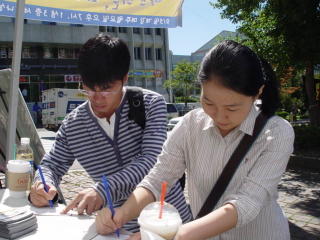
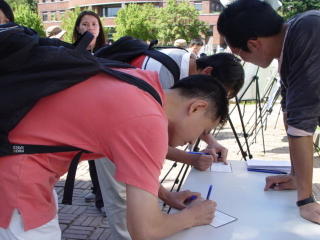
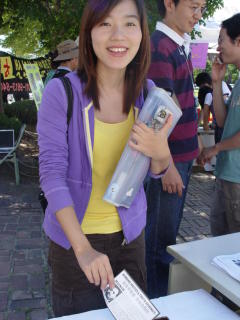

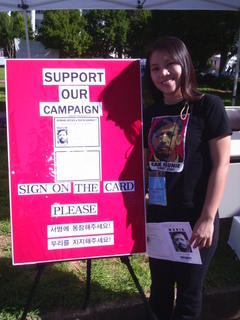
Downtown, In front of Post Office (Close to the Provincial Hall)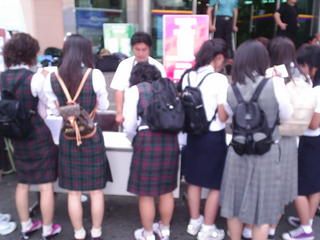







The Magnificient Team all smiles after a hard day's work and they will keep demanding: JUSTICE for MUNIR, JUSTICE for ALL !
Thursday, September 08, 2005
Justice to MUNIR, Justice for ALL !

Commemorating the 1st Death Anniversary of Munir
I. Objective
To make use of Munir’s 1st death anniversary to advocate his case to the Korean public by informing and getting their support through signature campaign. This campaign shall serve as contribution to the growing international pressure to Indonesian government to act judiciously on the assassination of Munir. 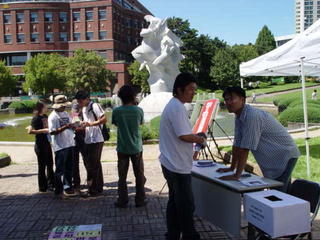
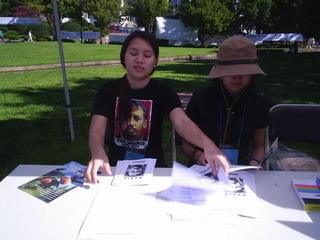
2. Forms of Action
Exhibition using campaign materials such as : Munir’s profile, pictures of human rights situation in Indonesia, and news articles on Munir case.
Spread and distribute leaflets on Munir case.
Gather signature by signing cards of support on Munir case addressed to the Indonesian President Soesilo Bambang Yudhoyono.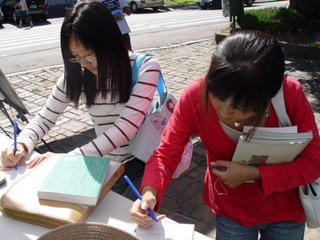
3. Description of Situation
At Chonnam University
We arrived there at about 09.00 AM. It is good that the weather that day was conducive for us to conduct the activity (there was an typhoon forecasted in the news). The wind has dropped down the exhibited boards several times but it did not disturb us so much. We did it at the across of the Student Center building. Many students walked around that area and passed our stand too. Some of us dispersed one by one in some spots around the area and spread the cards/leaflets and approached the people to sign. While the rest stayed in the desk to serve and wait on people who passed around. We kept explaining and informing the case directly to the people there. 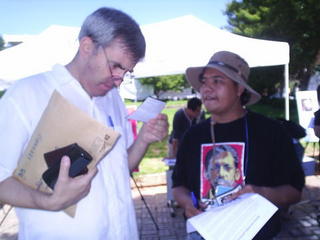
We also played the documentary films about Indonesia’s human rights issue/situation. We got more than half of all cards signed in this location. We left for Down Town at about 01.30 PM.
In Chonnam University, since it is a campus, the audience were mostly students, only few were lecturers. While in Down Town area, the audience is more varied. There are traders, workers, students, youths, monks, children, mothers, and other common people in it.
It means that we have targeted various kinds of people who were representatives of the Korean public. Therefore, it is justifiable to claim that we got the sympathy and support of the Korean public.
At Down Town
We arrived there at about 02.00 PM. We did it in front of the Post Office. It was on a crossroads where people passed by. Like in Chonnam University, some of us dispersed to different spots around the area; spread the cards/leaflets and approached the people to sign. 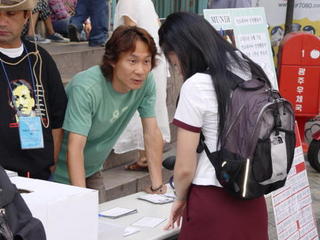
While the rest stayed in the desk (Sang Seon Kim, Jaedae Ko, Cheung Park) to inform and explain the campaigns in detail (obviously the interns can’t communicate in Korean !). The audience there was more varied. The people usually got attracted to the displayed pictures of violence (some were comparing it even to the scenes of the May 18 Gwangju Democratic Uprising). 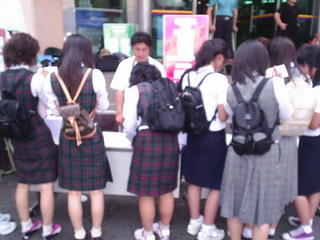
Some children look surprised ( I hope not shocked of the display of explicit and gory pictures). They showed their curiosity by asking many questions and giving comments ( So Agnes tried her best to talk to them in English, while they asked in Korean – hmmm wonder of dialogue) . So we explained the matter we were campaigning. We left that place at about 05.30 PM.
4. Result
1. Some photo/journalists came and covered the activity (newspaper – The Namdo Ilbo- at page 2 ! and two online news – www.kjdaily.com and www.moodeungilbo.co.kr wow !).
2. Of the 1000 cards we distributed, 800 were signed and 120 unreturned, only 80 were left empty.
We can conclude that this activity was successful in meeting its goals and objectives. We have concrete evidences as basis for this claim (hurrayyyyy !).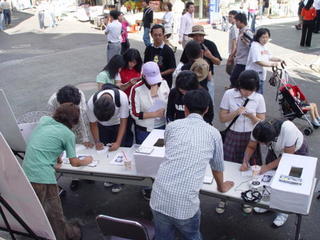
5. Lessons
It is very good to interact directly with Korean public and let them know about Munir case.
We have opportunity to be in touch with various kinds of Korean people (across age, gender, profession, etc. – I believe there were several foreigners as well )
The interns had a good opportunity to show cooperation by doing concrete international solidarity action for this very significant event.
We received full support from May 18 Memorial Foundation.
I personally felt I was not able to fully maximize the opportunity and explain to the public the case due to my lack of language facility.
As a first experiment of organizing and conducting this activity, this is a very good experience for me and for the interns as well.
I hope we can do such activities/ events in the future with better performance. 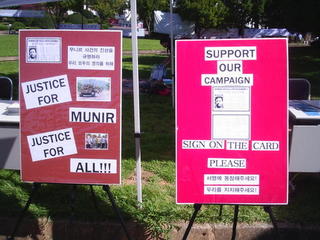
(Note: This is a syndicated report of Agnes Gurning of IKOHI, sorry I can't control my fingers to tap the keyboard and introduce my own commentaries- my apology, pete).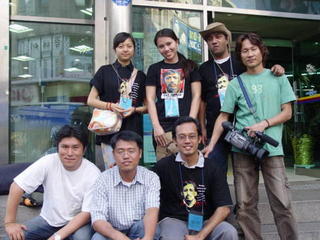
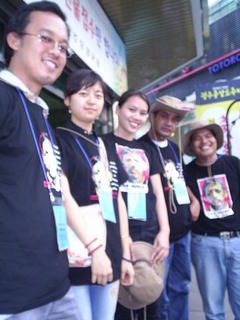
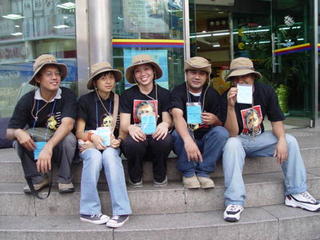
Thursday, September 01, 2005
Call for Application for the Gwangju Asian Human Rights Folk School
Call for Application for the Gwangju Asian Human Rights Folk School


The Gwangju Asian Human Rights Folk School aims to contribute to the development of democracy and human rights throughout Asia. Twenty (20) invitees from all over the Asia who have been working for human rights and peace organizations in their own countries shall be given an opportunity to learn and experience the history and process of the development of human rights and democracy in South Korea.
Participants will be introduced to Korean history in general and to the movements and struggle for democracy, including the 1980 Gwangju Uprising, both through theoretical and practical experiences such as seminars, discussions and field trips to the sites of democratization movements in Korea.
(Note: The activity is invitational only. Submitting an application does not guarantee an invitation. The foundation is doing its best to allocate the invitation to a wider reach and representation (sector, country, gender, issues, etc.). Also, this activity is conducted on a yearly basis so the chance of being invited is very high).
Please visit this site for more information about the foundation:
www.518.org
● General information
▤ Place: Gwangju, Republic of Korea
▤ Dates: 7~25 November 2005
▤ Number of participants: 20
▤ Held by : The May 18 Memorial Foundation, Gwangju, Republic of Korea
▤ Prerequisites:
Minimum 3-years experience in the field of Human Rights or peace organisation, and ability to communicate in English (evidence of qualifications must be submitted with application).
▤ Rules:
1. Participants may not bring their friends and family member for the duration of the programme.
2. Participants must stay in the accommodation allocated them for the duration of the programme.
3. Participants must participate in the programme fully, not using allotted times for their personal activities.
▤ Selection process:
Call for applications to be made through human rights and peace organisations in Asia; applications received will be assessed by the May 18 Memorial Foundation and applicants will be informed of the outcome.
▤ Expenses covered:
Cost of economy class air ticket, accommodation, food and education for duration of programme for overseas participants.
Domestic (Korean) participants will pay for the costs themselves.
▤ Application period:
24 August ~ 30 September 2005
Please find the Application Form attached to this e-mail.
● Syllabus
▤ First week: The History of the Korean Democracy Movement
1. Pay respects at the National May 18 Cemetery and introduction
2. Significance of the May 18 Uprising in the Korean Democracy Movement
3. Defeat of the military dictatorship
4. The history of the Korean Democracy Movement
▤ Second week: Human Rights in Asia
1. Inheritance of imperialism (overcoming colonialism, ideological conflict, ethnic problems, religious conflicts, and an overview of human rights in Asia)
2. Asian values and Orientalism
3. Cultural conflicts and unification
4. Ideological conflicts and state violence
5. Field visits (Pan Mun Jeom and the Korean Democracy Foundation)
▤ Third week: Korea and Asia
1. Civil society and NGOs (Non Governmental Organisations)
2. Anti-globalization/ Neo-liberalism
3. Development and environment (a. Development and dictatorship; b. Environment)
4. Group reports and networking
5. Trip, Closing Ceremony & Free Time
● Daily timetable
▤ 9:00~10:30 Lecture
▤ 10:30~11:30 Discussion
▤ 11:30~12:30 Lunch
▤ 12:30~14:00 Lecture
▤ 14:00~15:00 Discussion
● Contact
▤ Mr. Chanho. Kim
▤ Assistant Director of General Affairs Department of The May 18 Memorial Foundation
▤ Gwangju Asian Human Rights Folk School
▤ E-mail: may18interns@gmail.com
▤ Web: www.518.org
▤ Phone.: (+82) 62 456 0518 (Office), FAX: (+82) 62 456 0519, Mob: (+82) 10 4642 6650
























